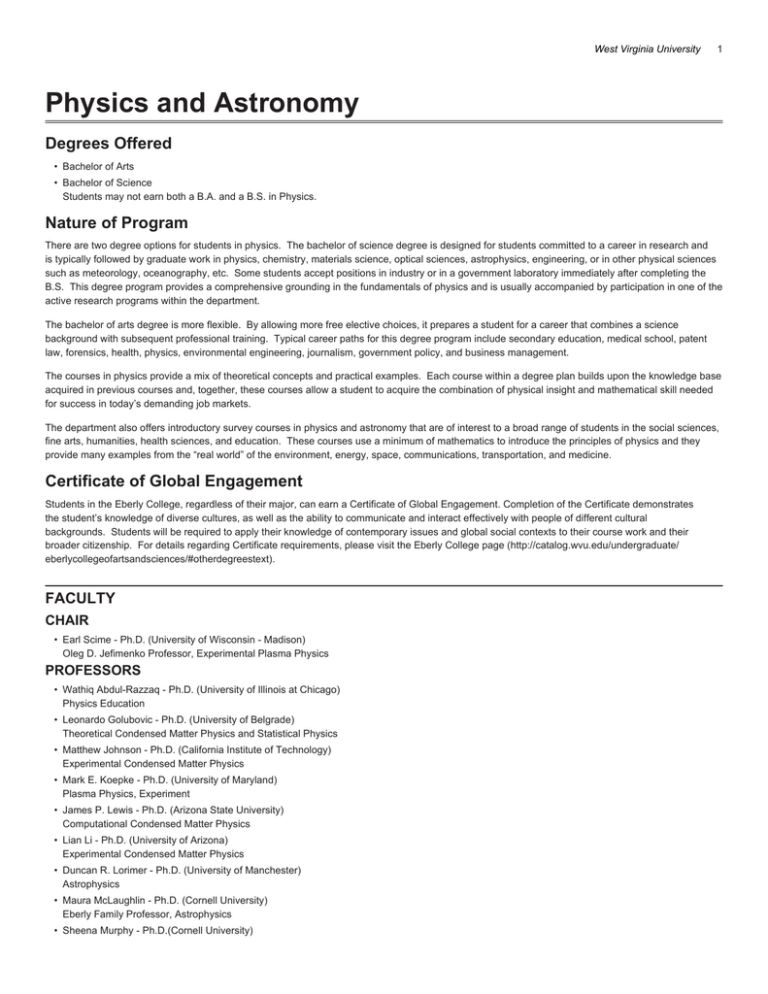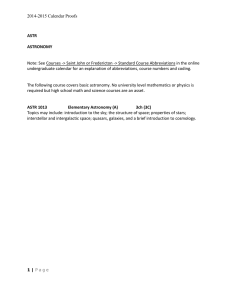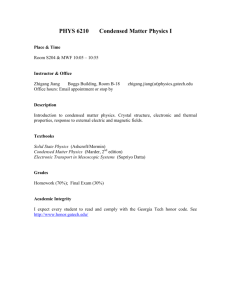PDF of this page - Catalog
advertisement

West Virginia University 1 Physics and Astronomy Degrees Offered • Bachelor of Arts • Bachelor of Science Students may not earn both a B.A. and a B.S. in Physics. Nature of Program There are two degree options for students in physics. The bachelor of science degree is designed for students committed to a career in research and is typically followed by graduate work in physics, chemistry, materials science, optical sciences, astrophysics, engineering, or in other physical sciences such as meteorology, oceanography, etc. Some students accept positions in industry or in a government laboratory immediately after completing the B.S. This degree program provides a comprehensive grounding in the fundamentals of physics and is usually accompanied by participation in one of the active research programs within the department. The bachelor of arts degree is more flexible. By allowing more free elective choices, it prepares a student for a career that combines a science background with subsequent professional training. Typical career paths for this degree program include secondary education, medical school, patent law, forensics, health, physics, environmental engineering, journalism, government policy, and business management. The courses in physics provide a mix of theoretical concepts and practical examples. Each course within a degree plan builds upon the knowledge base acquired in previous courses and, together, these courses allow a student to acquire the combination of physical insight and mathematical skill needed for success in today’s demanding job markets. The department also offers introductory survey courses in physics and astronomy that are of interest to a broad range of students in the social sciences, fine arts, humanities, health sciences, and education. These courses use a minimum of mathematics to introduce the principles of physics and they provide many examples from the “real world” of the environment, energy, space, communications, transportation, and medicine. Certificate of Global Engagement Students in the Eberly College, regardless of their major, can earn a Certificate of Global Engagement. Completion of the Certificate demonstrates the student’s knowledge of diverse cultures, as well as the ability to communicate and interact effectively with people of different cultural backgrounds. Students will be required to apply their knowledge of contemporary issues and global social contexts to their course work and their broader citizenship. For details regarding Certificate requirements, please visit the Eberly College page (http://catalog.wvu.edu/undergraduate/ eberlycollegeofartsandsciences/#otherdegreestext). FACULTY CHAIR • Earl Scime - Ph.D. (University of Wisconsin - Madison) Oleg D. Jefimenko Professor, Experimental Plasma Physics PROFESSORS • Wathiq Abdul-Razzaq - Ph.D. (University of Illinois at Chicago) Physics Education • Leonardo Golubovic - Ph.D. (University of Belgrade) Theoretical Condensed Matter Physics and Statistical Physics • Matthew Johnson - Ph.D. (California Institute of Technology) Experimental Condensed Matter Physics • Mark E. Koepke - Ph.D. (University of Maryland) Plasma Physics, Experiment • James P. Lewis - Ph.D. (Arizona State University) Computational Condensed Matter Physics • Lian Li - Ph.D. (University of Arizona) Experimental Condensed Matter Physics • Duncan R. Lorimer - Ph.D. (University of Manchester) Astrophysics • Maura McLaughlin - Ph.D. (Cornell University) Eberly Family Professor, Astrophysics • Sheena Murphy - Ph.D.(Cornell University) 2 Physics and Astronomy Experimental Condensed Matter Physics • Earl E. Scime - Ph.D. (University of Wisconsin - Madison) Oleg P. Jefimenko Professor, Plasma Physics, Experiment • Gay Stewart - Ph.D. (University of Illinois) Eberly Family Professor, Physics Education Research ASSOCIATE PROFESSORS • Alan Bristow - Ph.D. (University of Sheffield) Experimental Condensed Matter Physics • Paul Cassak - Ph.D. (University of Maryland) Plasma Physics, Theory • Paul Miller - Ph.D. (West Virginia University) Physics Education Research • D.J. Pisano - Ph.D. (University of Wisconsin - Madison) Astrophysics • Aldo Romero - Ph.D. (University of California - San Diego) Theoretical Condensed Matter Physics • Tudor Stanescu - Ph.D. (University of Illinois) Theoretical Condensed Matter Physics • John Stewart - Ph.D. (University of Illinois) Physics Education Research ASSISTANT PROFESSORS • Loren Anderson - Ph.D. (Boston University) Astronomy • Sarah Burke Spolaor - Ph.D. (Swinburne University of Technology) Astrophysics • Cheng Cen - Ph.D. (University of Pittsburgh) Experimental Condensed Matter Physics • Edward Flagg - Ph.D. (University of Texas - Austin) Experimental Condensed Matter Physics • Mikel Holcomb - Ph.D. (University of California - Berkeley) Experimental Condensed Matter Physics • Sean McWilliams - Ph.D. (University of Maryland) Astrophysics • Julian Schulze - Ph.D. (Ruhr University - Bochum) Plasma Physics, Experiment • Kathryn Williamson - Ph.D. (Montana State University) Physics Education Research • Weichao Tu - Ph.D. (University of Colorado - Boulder) Space Plasma Physics RESEARCH PROFESSORS • Vladimir Demidov - Ph.D. (St. Petersburg University) Plasma Physics and Plasma Chemistry RESEARCH ASSOCIATE PROFESSORS • Amy Keesee - Ph.D. (West Virginia University) Experimental Plasma Physics PROFESSORS EMERITI • Larry E. Halliburton - Ph.D. (University of Missouri - Columbia) Experimental Condensed Matter Physics • Arthur S. Pavlovic - Ph.D. Experimental Condensed Matter Physics • Mohindar S. Seehra - Ph.D. (University of Rochester) Eberly Family Professor, Experimental Condensed Matter Physics • Richard Treat - Ph.D. (University of California – Riverside) West Virginia University 3 • H. Arthur Weldon - Ph.D. (Massachusetts Institute of Technology) Admission Requirements Honor students and students who qualify to take college Algebra (MATH 126) or above, after taking the ALEKS Assessment (http://math.wvu.edu/ placement), are admitted directly into the B.A. or B.S. physics program. Students transferring from another major must meet milestones set by the department: a GPA of 2.2 in math & physics courses with at least one math & physics course completed and a 2.0 overall GPA. Please see a departmental adviser for details. Benchmark Expectations Students must have a cumulative GPA in the major requirements of 2.2 or better after completing two physics courses, or they will be placed on probation. • Students who do not raise their GPA in the major requirements above 2.2 after one semester on probation will be removed from the major. • Students may repeat any physics or mathematics course for which the grade is a D/F/W. If a course is repeated, the GPA will be calculated according to the WVU repeat policy. • Students not able to attain better than a D/F/W by the second attempt in a mathematics or physics course will be placed on probation. • A student with three grades of D/F/W in the same physics or mathematics course will be removed from the Major. Major Learning Goals PHYSICS AND ASTRONOMY Upon successful completion of the B.A. or B.S. degree, Physics majors will demonstrate: 1. An understanding of and ability to solve basic conceptual and quantitative problems in theoretical mechanics, electricity and magnetism, quantum mechanics, and thermodynamics. 2. An ability to perform accurate measurements of physical systems and communicate the results and implications of those measurements orally and in writing. 3. An ability to develop experiments to test basic or applied research questions, to perform accurate experimental measurements, and to critically evaluate others’ answers to research questions. 4. Preparation for success in graduate school or in post baccalaureate degree job placement. ASTRONOMY MINOR MINOR CODE - U087 Physics majors may complete an astronomy minor, provided the ASTR courses counted toward the minor are not counted as electives toward the physics major. A minimum grade of C or better is required in each course counted toward the minor. Students must earn a minimum overall GPA of 2.00 in all courses applied to the minor. Core Courses: PHYS 111 General Physics 4 PHYS 112 General Physics 4 PHYS 314 Introductory Modern Physics 4 Upper Division Electives: * 9 Select three electives from any ASTR courses numbered 300 and above. Total Hours * 21 An ASTR course applied toward an ASTR minor may not be counted toward a PHYS minor. PHYSICS MINOR MINOR CODE - U026 A grade of C- or better is required in each course counted toward the minor: Core Courses: PHYS 111 General Physics 4 PHYS 112 General Physics 4 PHYS 314 Introductory Modern Physics 4 General Electives: 6 4 Physics and Astronomy One PHYS course at the 300-level or above One PHYS or ASTR course at the 300-level or above * Total Hours * An ASTR course applied toward an ASTR minor may not be counted toward a PHYS minor. 18



